


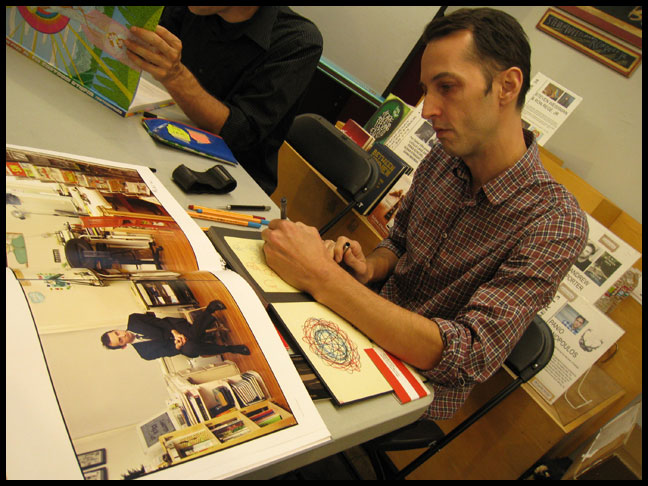
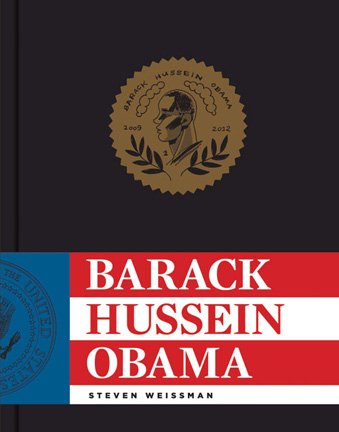
STEVEN WEISSMAN is a great distributor of ink. He marks his pages with a few dots here, a couple of lines there—drops in the text—and creates some of the most compelling comics done today. A master of pen and ink, with his trusty notebooks at his side, Steven just published (through Fantagraphics) the challenging yet highly entertaining comic book, Barack Hussein Obama. It defies typical description, which is why when you read about it on Amazon, you realize they’re not quite sure what to make of it. It’s Steven’s latest opus, and yes, he keeps putting out one amazing book after another.
I met with Steven at a Thai Restaurant in Hollywood, one night in October. He only had a short time before having to pick up his son from school. Mistakenly, I brought along a portfolio filled with original comic art. We spent half the time discussing the art I had brought. But we still found time to talk about his work.
THE INTERVIEW

The Writing Disorder: Here’s some artwork I purchased from Lilli Carré.
Steven Weissman: I met her recently, she’s great. Her style has really changed over the years. She also does animation pieces that are very sharp.
The Writing Disorder: This is a page from Jessica of the Schoolyard.
Steven Weissman: By Karl Wills. I know his work, too.
The Writing Disorder: And here are some old Nancy comic pages. I think Ernie Bushmiller actually drew these, even though they’re from the 1970s.
Steven Weissman: I’m excited that Fantgraphics is finally putting out all the old Nancy comics. They’ve been out of print for a long time. That’s what I used to love — when I first started going to comic conventions, you could get an old western comic page by some unknown artist for about ten or twenty dollars. Everything was super cheap back then.
The Writing Disorder: Do you collect comic art?
Steven Weissman: A few pieces here and there. Not a lot, though. Everything is so expensive now. But I may have some pieces from friends who draw comics, or stuff I’ve worked on with other artists. Gaston at Meltdown comics in Hollywood has a great collection of comic art. He has a lot of Chris Ware and Daniel Clowes pieces that are amazing.
The Writing Disorder: That’s what I love about your work — the minimal line use in your drawings, especially with your characters, to convey all these different emotions. It’s amazing the economy of your work.
Steven Weissman: It takes a long time to be able to reduce the amount of information on the page, and still get your point across. I kind of always struggle with that, like I’m at war to try and minimize the art on the page. I always feel like I have to add. But you kind of have to add and subtract as you go along, to keep it working — at least for me. But there’s not one direction that I go in. It’s not like I’m always trying to reduce. It gets to a point where it looks minimal but I always want to add to make it interesting, and then it gets too busy and crowded. So it’s a constant struggle. The more lines you draw, the harder it is to make something appealing. With monsters and old people, you can put in all the lines you want. But with children or young women, you need to make it more simple. I’m always working on my line work.
The Writing Disorder: What materials do you use to create your comics?
Steven Weissman: I use these notebook drawing pads and some special pens. I did the entire Barack Hussein Obama book with these notebooks. And I use these adhesive print sheets for the dot patterns—some that are extremely toxic. They're super adhesive. I rarely use this brand now now, but I use something similar in my work. Sometimes I use it because it really destroys the image.
The Writing Disorder: Do they still make this stuff?
Steven Weissman: Yes, but not that brand. I started using it on some of my older work and it had really bad glue adhesive. So then I just started using it in small places on certain pages, for the effect. I’ve looked for this same brand, but have had no luck. But I get something similar now.
The Writing Disorder: And this is your current sketchbook?
Steven Weissman: Yes, just daily observations and notes. Those are people I drew in church. If I don’t draw then I daydream and I end up sleeping through everything. So I draw everyday.
The Writing Disorder: Do people ever catch you drawing them?
Steven Weissman: No. But I draw the same people over again and again, because I usually sit in the same place to observe them.
The Writing Disorder: Do you have a lot of these sketchbooks?
Steven Weissman: Yes. The Obama book was done over the course of four sketchbooks. But I have sketchbooks going back to the time when I first started drawing.
The Writing Disorder: What kind of pen do you use?
Steven Weissman: My sister-in-law used to get me these pens from Germany, but now you can get them at any art store.
The Writing Disorder: When I first started reading your Barack Hussein Obama book, I thought that maybe these were quotes. But of course, they’re not. And the more I read, the more I realized that they're not. But they sometimes came across that way.
Steven Weissman: Like the first one, “Charlie Brown is a Jew.” My friend said that a while ago. We were sitting around watching the Christmas special and he said that he heard it on the news that Charlie Brown was a Jew. So in any of the cartoon formats I was currently using, I had no use for that quote but I wanted to use it. And I thought what if someone well-known had said it, like Barack Obama. Then it would lend it more weight. So I used it in the book. Sometimes I would borrow quotes, like when I first introduced Hilary Clinton, I didn’t know how to write for her. I never used that character before, so when I first started writing it, I borrowed a piece from a Peanuts strip featuring Lucy. I sort of saw Hilary Clinton as a kind of Lucy-like character.
The Writing Disorder: So how did the book come about?
Steven Weissman: I just started doing the strips, just to have something to work on. And early on, people were encouraging me. They thought it would make a nice collection. But I just started doing them until I thought of the next big project I wanted to work on. But it was fun and challenging to work on them on a weekly basis. So when I got about half of the sketchbook done, I started thinking about putting them together. And I may continue with the series, depending on how the book does.
The Writing Disorder: And the title of the book, your decision to use his entire name?
Steven Weissman: When Obama first ran for President, many Republicans would refer to him as Barack Hussein Obama, as well as many of the right-wing radio and television commentators. They used it to make him sound so frightening and un-American. I thought it was funny. And in comics it’s almost a cheap way to get attention. When I tell someone about the title of my new book, they always have a reaction, like, oh, you must feel this way or that way about him. It definitely gets people’s attention. Of course, now the only people who use his full name are kind of nuts. The mainstream media kind of stopped using it a few years ago. Now they call him Obama or Barack Obama, but they never call him President. Like you hear the media use Governor Palin or Governor Romney, but you never hear President Obama in the media. So when I first started drawing the comic, I thought what if Barack Hussein Obama had said that?
The Writing Disorder: When I finished reading the book, it almost felt like a story, like you had these characters and you took them on this journey.

Steven Weissman: Since I was working on it weekly, and I sort of grew up on serial comics and weekly TV shows, it sort of turned out that way. Even daily comics can have a continuing storyline. As a cartoonist, you want to pick up where you left off, like where did I leave this character last time. Or, that was a pretty good joke, I want to try and develop it further. And his whole character was sort of transforming and developing as I went along.
The Writing Disorder: You also have Joe Biden and Hilary Clinton characters.
Steven Weissman: Yes, they almost took over the book. Joe Biden is great. And Hilary, as soon as she is transformed into this creature, she became my favorite character. Of course, they’re totally not like the people they are in real life, but they still seem like real people.
The Writing Disorder: They seem plausible. Where did you grow up?
Steven Weissman: Near Stanford University. My dad is a teacher there. He teaches immunology and mircobiology. He’s kind of like a mad scientist – very smart.
The Writing Disorder: Is there any science in you?
Steven Weissman: No. I thought when I was a kid I might. I used to collect reptiles and thought I might be a Herpetologist. But I also drew cartoons, and those two things were sort of competing.
The Writing Disorder: So you’ve always drawn cartoons?
Steven Weissman: Yes, definitely.
The Writing Disorder: Did anyone else in your family draw?
Steven Weissman: I have an older sister who would draw, we were both sort of the middle kids. And for some kids it becomes a form of communication early on. I was probably less socially competitive to get a point across, so I would probably use drawing as a form of communication – just with my dad. And in high school I used to draw cartoon strips, little Far Side rip-offs. I think they called it the Near Side.
The Writing Disorder: How big is your family?
Steven Weissman: I have two sisters and a brother and a half sister. I’m the third born of four. All the kids are about three years apart. But we’re pretty close. Some live down here, some in Northern California. I’ve lived in Palo Alto and San Francisco, and around Stanford.
The Writing Disorder: So how did you get into comics — as a creator?
Steven Weissman: Wanting to do something in my late teens and just wandering around sort of aimless-like. And it seemed sort of obvious to try comics. That was the only thing I could really imagine myself doing at the time. So probably around nineteen or twenty I started taking more classes. I was always taking art classes. So as I got older it became evident that I had to try and do it. I took classes at the Academy of Art in San Francisco, and before that I was at San Francisco State. I had some very good teachers. There were no cartooning class though, mostly drawing and illustration classes. So I got as much training as I could.
The Writing Disorder: So you didn’t want to be an illustrator?
Steven Weissman: No. Some people are naturally gifted to be illustrators, but I was more interested in drawing comics and telling stories — using humor and jokes.
The Writing Disorder: And you started to self-publish your work?
Steven Weissman: Yes, Yikes! Was my first publishing effort. And I did some at school that were for anthologies. But with Yikes! We printed them at a print shop after hours. And we put the whole thing together. We used rubylith and overlays and made the colors plates — before computers. My friend showed me how to print the whole book. So I learned all this stuff about printing that I wasn’t getting in school. We printed about 250 copies. And then we did another edition that was more elaborate. After that I started getting more jobs and we printed more books. And I started contacting distributors and publishers and getting my comics around. But after a while it got to be a lot of work. I was always terrible at promoting my own stuff. Then someone offered to start publishing my work, so I took that opportunity, and I never wanted to print my own work again. But it was fun and I learned a lot. It was sort of mental muscle building.
The Writing Disorder: A lot of your work is now published by Fantagraphics.
Steven Weissman: I grew up on Love and Rockets and Eightball. So I sort of grew up on their comics.
The Writing Disorder: Did they approach you?
Steven Weissman: Their publisher, Gary Groth, did. He called me one day about publishing my work. They used to be in Los Angeles and then moved to Seattle.
The Writing Disorder: When they printed your Obama book, did they tear apart your notebooks?
Steven Weissman: No, they just scanned all the pages as is. They layed it flat on the scanner. So they don’t damage the originals. I may sell some pages from the book, but I would hate to break it up.
The Writing Disorder: What comics did you read growing up?
Steven Weissman:I read a lot of superhero comics. Also, the Archie and Harvey comics too. Since I had a lot of siblings, all the kids would read comics. A lot of us would have one series we would buy. My older sister would buy the Archies. My younger sister would buy Harvey comics, and I would buy the Marvels. My older brother wasn't really buying then. He went through that phase before. So when I first started reading comics he handed me all of his early ’70s comics, Fantastic Four and X-Men, and those were kind of like little bibles for me. I thought they were so amazing. I was such a fan of X-Men when I was 10-12 years old it was a huge deal. That title was exploding at that point anyway, and I have some of the issues that came out before. There's a weird kind of thing about comics from right before you started reading comics so those were really special, the early ‘70s things. Or they were mid-’70s actually. So I read all of those. I read newspaper comics too, and Mad Magazine. Newspapers comics would have been ... obviously Peanuts, and Gordo was pretty popular in our house. My parents loved Doonsbury so I would read Doonsbury and try to pretend I understood it. I was a big fan of Garfield and Broom-Hilda. Whatever the San Francisco Chronicle was running when I was a kid, I would read all of it. I would read Cathy as terrible as that was.
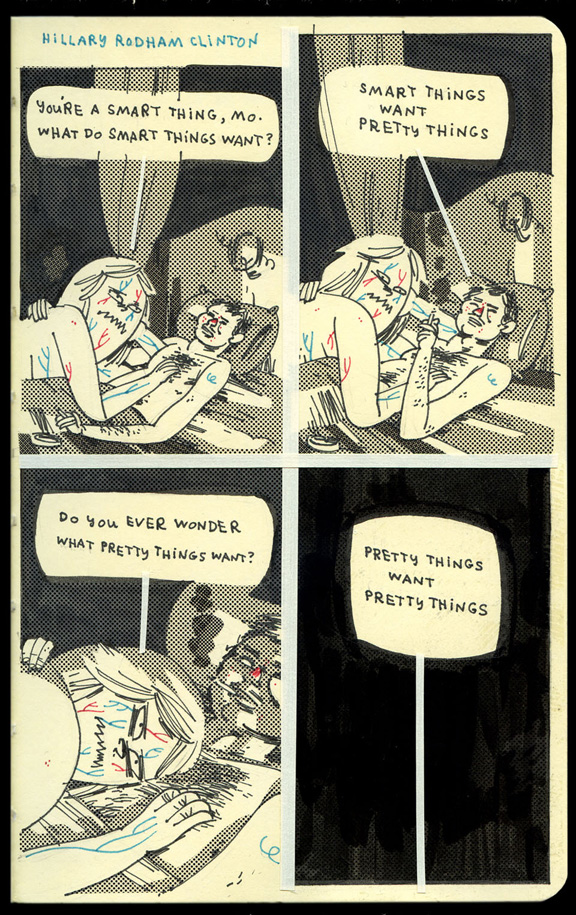
The Writing Disorder: Have you read your Wikipedia page?
Steven Weissman: Do you know who Josh Neufeld is? He's a cartoonist and we used to be friends in San Francisco. I think he wrote it. He compiled that from various sources, if it's the same one that was up there a few years ago. One of my relatives was like, “You're on Wikipedia!” and I'm like “Shit yeah! This is unreal!” But then I was reading it, I was like, “Who wrote this, I think someone who knows me wrote this.” I later found out that Neufeld was a contributor to Wikipedia. He did a great job. I was really excited he was willing to do that for me.
The Writing Disorder: It said you were influenced my Charles Schulz and Peanuts.
Steven Weissman: Neufeld is a smart guy. We both lived in San Francisco, so we would go to baseball games together and talk about comics.
The Writing Disorder: I have a friend, he's a writer. One day there was a Wikipedia profile of him that somebody wrote. And it said he was the heir to some great fortune in France. He was like “What?!”
Steven Weissman: Was that just totally made up and embelished detail?
The Writing Disorder: He thinks so. He was said to be the heir of some family in France who had a cosmetics company. So a couple years ago somebody contacted him and I think it was true!
Steven Weissman: It ended up being true?
The Writing Disorder: Somebody contacted him specifically about that. “We have a lost relative of yours, blah, blah, blah” I don't know what happened. It's just weird. He doesn't know who wrote it. It just appeared there, with all this bizzare stuff. And this one bizarre thing came back to haunt him.
Steven Weissman: I heard with Wikipedia you can edit it.
The Writing Disorder: I think you can edit your own bio.
Steven Weissman: I mentioned it to Fantagraphics multiple times, “Should we go in and update Wikipedia to include the books that were published later?”
The Writing Disorder: Anybody can go in and update it.
Steven Weissman: Well, that's good.
The Writing Disorder: Do you spend a lot of time on the internet?
Steven Weissman: I think it's like everything, it's borderline unhealthy.
The Writing Disorder: So you spend a lot of time there?
Steven Weissman: Yes, I'll goof around on Twitter or something like that just talking to people just because something's due during the day. It's like having people around because I'm by myself most of the time.
The Writing Disorder: So you use Twitter?
Steven Weissman: I do. I've been on there since last year. It's pretty fun. Usually if I get on social media, every format, I'll eventually bomb out on it. I'll get into it and after a while I'll just hate it. Then just quit my account. I was on Flickr for a few years, I thought that was really great. By the end of it, I didn't have to, but I wasn't paying for it anymore.
The Writing Disorder: You have to pay for it?
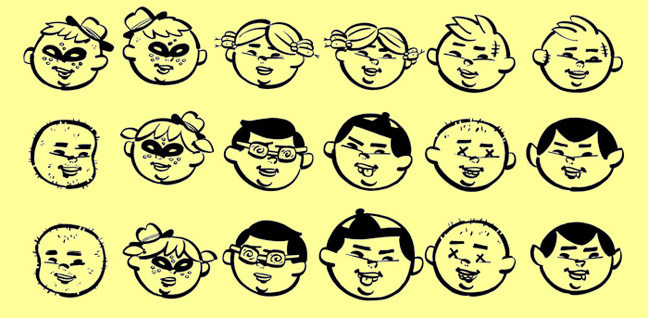
Steven Weissman: Well, if you wanted more than 200 photos you had to pay for it. So I pay for it. I was getting it free because I had a yahoo account anyway. Then I was paying for it just to hold my photos. Then I started hating it. It seemed kind of dead anyway. With social media, people migrate from one format to the next. With the pay format, it felt like you were buying a house in a neighborhood and you were stuck there. I do like the migratory aspect of the internet. So for short term periods I think it's really great to try. My friend got me into Instagram a couple months ago. I didn't really get it at first, I just kind of got an account and put up a couple of things. But over the past couple weeks I'm like, “Oh this is kinda fun, I can kinda see how it's like an image twitter.” And I do Tumblr. I like all that stuff but I burn out on each one. I did Facebook for about a month, five or six years ago and I just could not handle it. It was not for me.
The Writing Disorder: I think I was friends with you on Facebook, and then you disappeared.
Steven Weissman: I think that was my first real tryout of doing an all-encompassing social media. It was too many things from too many places. I didn't know to compartmentalize it so I was just like “I can't do it! I quit! I'm not going back!” I think I lack maturity in that way. I just sort of fly from application to application. Wherever it seems like there's some kind of interest.
The Writing Disorder: What is the editing process like for you? Do you come up with an idea first and draw the images, or do you draw something that inspires an idea?
Steven Weissman: My process has changed over time from almost completely image-based to idea-driven comics. With my earlier work like Yikes! I would begin with an image or particular interaction and then build around it. With Barack Hussein Obama, if there isn't some obvious forward momentum driven by a previous strip, I begin by listing events and ideas currently happening around me. One or two of those will jump out as being most important, and I can work from there.
The Writing Disorder: How long does it take you to finish a piece, like a four-panel strip for the Obama book?
Steven Weissman: Usually one day.
The Writing Disorder: Name three artists that influenced your work. What did you learn from them?
Steven Weissman: Mats Stromberg, Johnny Ryan and Jordan Crane
From Crane I learn a lot of stuff, and a lot of it is technical. He’s also affected how I consider design and time management.
Mats and I shared a studio for a couple of years and his approach to work had a big impact on me. He's fearless about trying new things and his keen observations give serious weight to his fantastic drawings.
Johnny's early willingness to sacrifice everything to even the stupidest joke was already inspiring, but his more recent explorations of what I assume are his worst nightmares is liberating just about everyone who sees them.
The Writing Disorder: What books are you reading now? Comics and non-comics.
Steven Weissman: Farmer Boy by Laura Ingalls Wilder, The Bounty Mutiny by Bligh and Christian, and Tubby by John Stanley
The Writing Disorder: Do you like collaborating, or do you prefer working on your own?
Steven Weissman: I like to work on my own. Collaboration is okay in short bursts, especially for $.
The Writing Disorder: Which comic artists do you keep in touch with, or are friends with?
Steven Weissman: Jordan Crane, Mats!?, Michael Daedalus Kenny, and Johnny Ryan are cartoonists I see or speak with the most.
The Writing Disorder: Once you finish a book or project and send it to the publisher, are there more changes made, or do they pretty much accept the work as is?
Steven Weissman: The editing style at Fantagraphics is pretty hands-off, so the content has to be ready to go when I send it in. Putting the package together, once I've turned it in, is much more collaborative. Lead designer Jacob Covey and I have been working together since Chewing Gum In Church, and I feel comfortable enough in having almost no idea about the presentation before speaking with him.
The Writing Disorder: What projects are you working on now, and/or are planning for the future?
Steven Weissman: I continue to work a weekly Barack Hussein Obama strip, up every Tuesday at What Things Do. Mats and I are always working on Stinckers stuff; either our own designs or with other like-minded artists. I also have regular, not at all glamorous commercial and teaching assignments. And, of course, pipe-dream stuff, but that's hardly work.
The Writing Disorder: What is your all-time favorite comic? favorite issue? favorite strip?
Steven Weissman: From Peanuts, the "Cool Breeze" strip.
The Writing Disorder: What is your most cherished possession — not including living things?
Steven Weissman: Piles and piles of artwork.
The Writing Disorder: What are your favorite movies, music?
Steven Weissman: Movies; Below The Belt (1974), Dark Passage (1947), The Raid: Redemption (2011).
Music; "Golden Bells" by the Harmonizing Four, "I'm A Cool Teenager" by El Pauling and the Royalton, "Innersanctum" by Jim Wolfe and the T-Towners.
These are recent favorites, I can't say what I'll think of them next year.
The Writing Disorder: Do you write short stories or poetry?
Steven Weissman: Only what I can put into my comics.
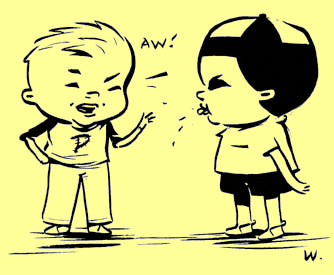
Steven Weissman (also known as “Ribs”) has written and drawn comics for Fantagraphics Books, Nickelodeon Magazine, Last Gasp, Marvel Entertainment (for whom he created the "Mini-Marvels" series) and numerous other publishers/publications. He won the Harvey Kurtzman Award for “Best New Talent” in 1998 with his acclaimed, ongoing series, Yikes. Featuring an assortment of genuinely charming and idiosyncratic characters. Yikes has been collected into several books; among them Chewing Gum In Church, Champs and Chocolate Cheeks.
View more of his work: Steven Weissman
ISSUE:
W I N T E R
2012-2013
SUPPORT THE ARTS
DONATE TODAY
GET A FREE T-SHIRT!
By accessing this site, you accept these Terms and Conditions.
Copyright © 2010-2013 TheWritingDisorder.com ™ — All rights reserved